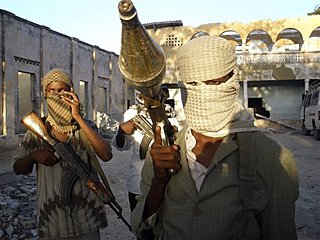Somali insurgents impose Islamic law in government stronghold
 Nairobi/Mogadishu - Somali insurgents have installed strict Islamic law in Baidoa, the seat of the Somali government, after taking control of the town.
Nairobi/Mogadishu - Somali insurgents have installed strict Islamic law in Baidoa, the seat of the Somali government, after taking control of the town.
Main insurgent group al-Shabaab took over the town on Monday only hours after the pullout of Ethiopian troops who had been propping up the central government for two years.
Baidoa was one of the last remaining strongholds of the government, which now only controls parts of the capital, Mogadishu.
Sheikh Muktar Robow Mansoor, spokesman for al-Shabaab, told a rally in Baidoa that the insurgent group wanted to rule Somalia with sharia law and would reject any government that did not do so, Radio Garowe reported.
Despite al-Shabaab's advances, political moves are still ongoing to create a larger national parliament and elect a new president.
Somali MPs, meeting in neighbouring Djibouti on Monday, voted to double the number of seats in parliament from 275. The enlarged body would have 200 seats set aside for the Islamist Alliance for the Re- Liberation of Somalia (ARS).
Somalia is also expected to hold a presidential election on February 2.
ARS leader Sheikh Sharif Sheikh Ahmed is running, along with current Prime Minister Nur Hassan Hussein.
President Abdullahi Yusuf Ahmed resigned in December after parliament thwarted his attempt to sack Hussein.
Some are hoping that the expanded parliament, a new president and the departure of the Ethiopians will increase the prospects of peace in Somalia.
However, al-Shabaab, which the US says is linked to al-Qaeda, in recent months seized huge swathes of territory as the government fell apart.
Al-Shabaab has faced opposition from rival Islamist militias, raising fears of a fracturing of armed groups and an intensification of the conflict.
Only an undermanned African Union (AU) force of around 3,000 troops from Uganda and Burundi remains to back government forces, although the two countries have put two extra battalions on standby.
The AU is desperately trying to scrape up more troops, but the United Nations has ruled out sending in a peacekeeping force.
Ethiopian forces invaded in late 2006 to help kick out the Islamic Courts' Union, a hardline Islamist regime that was in power for six months.
The invasion sparked a bloody insurgency that has killed an estimated 16,000 civilians and displaced around 1 million.
The conflict, combined with drought and rising food prices, has created a humanitarian catastrophe. Some 3.25 million people in Somalia, almost half the population, are dependent on food aid.
The Horn of Africa nation has been mired in chaos since the 1991 ouster of dictator Mohamed Siad Barre. (dpa)